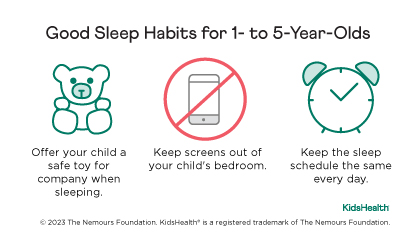Sleep is important for children's growth, development, and overall health. Help your child develop good sleep habits early so they can get the sleep they need.


Keep the sleep schedule the same every day. Set regular bedtimes, wake-up times, and nap times for your child. If your child no longer takes naps, schedule some quiet time during the day.
Have a relaxing bedtime routine for your child. It should take about 30 minutes and can include going to the bathroom, getting a diaper change, brushing teeth, and quiet activities like story time. If your child has trouble falling asleep, you can try:
Make the bedroom quiet and restful. Don't keep a TV, phone, computer, video games, or any other screens in your child's room.
What to do about nighttime awakenings. Follow these tips if your child gets up in the middle of the night:
Encourage habits during the day that help your child get better sleep at night. Help your child limit caffeine (found in tea, soda, and chocolate), especially in the late afternoon and evening. Caffeine can keep your child awake or make it harder for them to fall asleep. Encourage your child to get plenty of physical activity. This can help them sleep better.


How much sleep does my child need? Although it can vary, toddlers (1–2 years) need 11–14 hours a day, including naps, and preschoolers (3–5 years) need 10–13 hours a day, including naps.
How often should my child nap? While every child has different needs, in general: